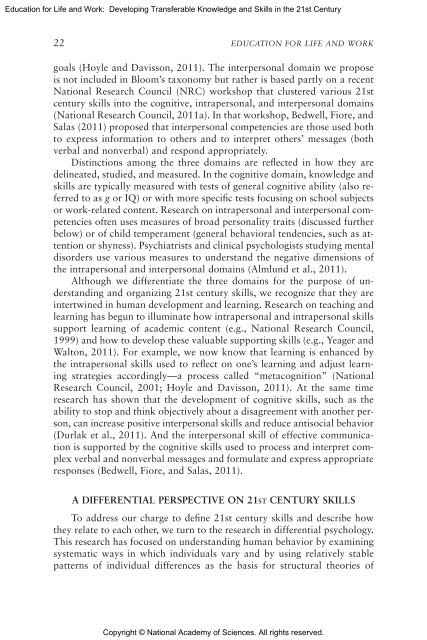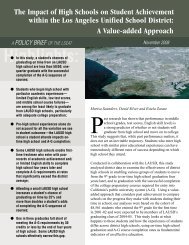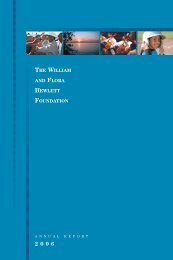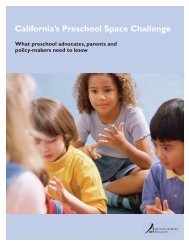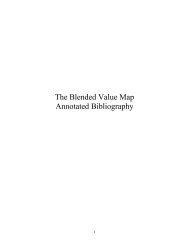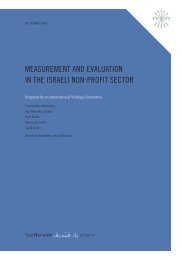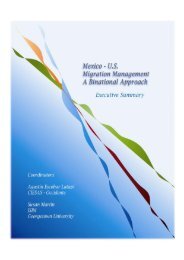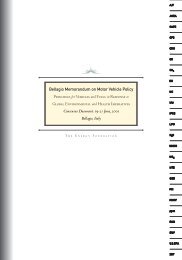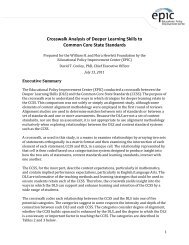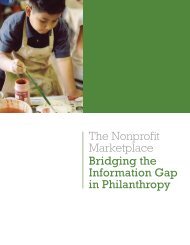EDUCATION FOR LIFE AND WORK - Hewlett Foundation
EDUCATION FOR LIFE AND WORK - Hewlett Foundation
EDUCATION FOR LIFE AND WORK - Hewlett Foundation
Create successful ePaper yourself
Turn your PDF publications into a flip-book with our unique Google optimized e-Paper software.
Education for Life and Work: Developing Transferable Knowledge and Skills in the 21st Century<br />
22 <strong>EDUCATION</strong> <strong>FOR</strong> <strong>LIFE</strong> <strong>AND</strong> <strong>WORK</strong><br />
goals (Hoyle and Davisson, 2011). The interpersonal domain we propose<br />
is not included in Bloom’s taxonomy but rather is based partly on a recent<br />
National Research Council (NRC) workshop that clustered various 21st<br />
century skills into the cognitive, intrapersonal, and interpersonal domains<br />
(National Research Council, 2011a). In that workshop, Bedwell, Fiore, and<br />
Salas (2011) proposed that interpersonal competencies are those used both<br />
to express information to others and to interpret others’ messages (both<br />
verbal and nonverbal) and respond appropriately.<br />
Distinctions among the three domains are reflected in how they are<br />
delineated, studied, and measured. In the cognitive domain, knowledge and<br />
skills are typically measured with tests of general cognitive ability (also referred<br />
to as g or IQ) or with more specific tests focusing on school subjects<br />
or work-related content. Research on intrapersonal and interpersonal competencies<br />
often uses measures of broad personality traits (discussed further<br />
below) or of child temperament (general behavioral tendencies, such as attention<br />
or shyness). Psychiatrists and clinical psychologists studying mental<br />
disorders use various measures to understand the negative dimensions of<br />
the intrapersonal and interpersonal domains (Almlund et al., 2011).<br />
Although we differentiate the three domains for the purpose of understanding<br />
and organizing 21st century skills, we recognize that they are<br />
intertwined in human development and learning. Research on teaching and<br />
learning has begun to illuminate how intrapersonal and intrapersonal skills<br />
support learning of academic content (e.g., National Research Council,<br />
1999) and how to develop these valuable supporting skills (e.g., Yeager and<br />
Walton, 2011). For example, we now know that learning is enhanced by<br />
the intrapersonal skills used to reflect on one’s learning and adjust learning<br />
strategies accordingly—a process called “metacognition” (National<br />
Research Council, 2001; Hoyle and Davisson, 2011). At the same time<br />
research has shown that the development of cognitive skills, such as the<br />
ability to stop and think objectively about a disagreement with another person,<br />
can increase positive interpersonal skills and reduce antisocial behavior<br />
(Durlak et al., 2011). And the interpersonal skill of effective communication<br />
is supported by the cognitive skills used to process and interpret complex<br />
verbal and nonverbal messages and formulate and express appropriate<br />
responses (Bedwell, Fiore, and Salas, 2011).<br />
A DIFFERENTIAL PERSPECTIVE ON 21st CENTURY SKILLS<br />
To address our charge to define 21st century skills and describe how<br />
they relate to each other, we turn to the research in differential psychology.<br />
This research has focused on understanding human behavior by examining<br />
systematic ways in which individuals vary and by using relatively stable<br />
patterns of individual differences as the basis for structural theories of<br />
Copyright © National Academy of Sciences. All rights reserved.


